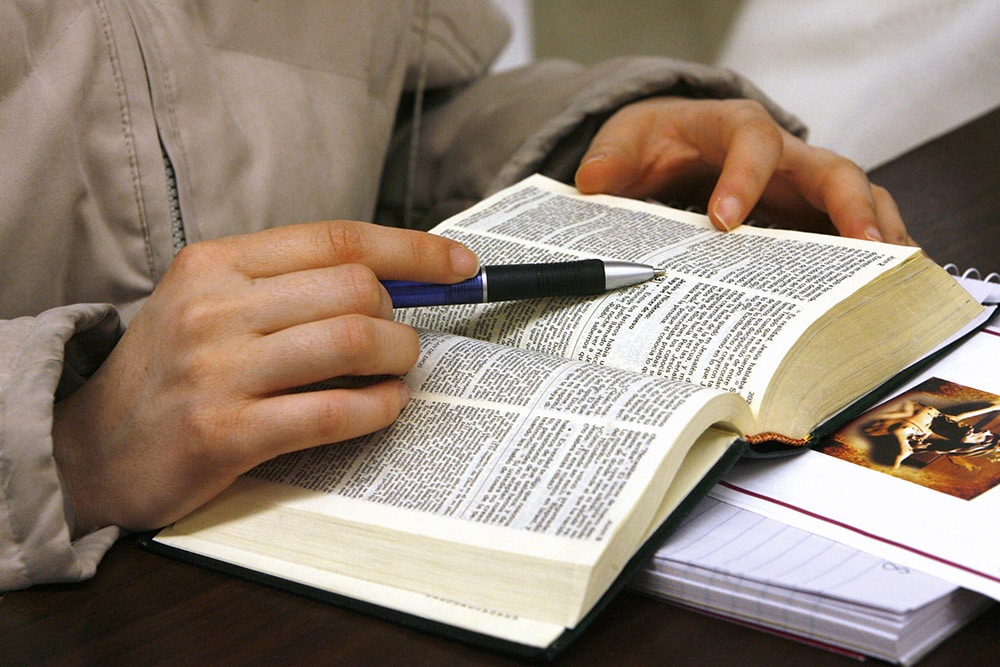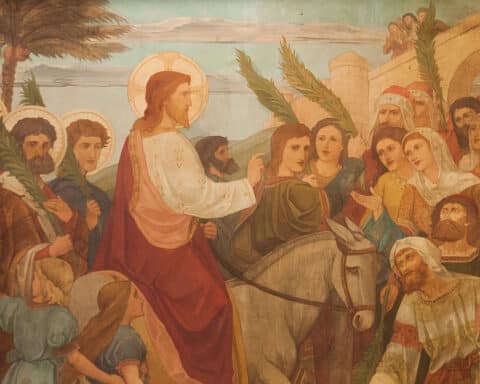In a clearly pre-planned maneuver, on the feast of the Church’s greatest biblicist, St. Jerome (Sept. 30), Pope Francis released a new apostolic letter motu proprio (“on his own initiative”) on sacred Scripture establishing a special Sunday of the Word of God. From now on, every Third Sunday of Ordinary Time will be devoted to the Bible, a day on which the Scriptures will be celebrated in particular and even enthroned in the liturgy. The pope originally proposed the idea of “a Sunday given over entirely to the word of God” during the Jubilee year in 2016.
This move is the next logical step in a decadeslong magisterial emphasis on Scripture, largely launched by the Second Vatican Council’s document on the topic, Dei Verbum (1965). Soon after, the Church expanded the Lectionary to cover more of Scripture (1970). Since that time, many new Bible translations, Bible studies, Scripture-focused degree programs, biblical commentaries and study Bible projects have been undertaken throughout the Catholic world. In 2008, Pope Benedict XVI brought together the bishops for a synod to discuss “The Word of God in the Life and Mission of the Church,” a discussion which resulted in his apostolic exhortation Verbum Domini (2011).
Hearing holy words
In his new letter, Pope Francis recalls the poignant scene from the Book of Nehemiah where the sacred scrolls are read aloud to the Jews who have returned from exile to Jerusalem. In response to hearing the holy words, the people weep but are encouraged by their leaders to rejoice instead, “for the joy of the Lord is your strength” (Neh 8:10).
Indeed this scene pairs well with the Easter Sunday walk to Emmaus, with which the pope opens his letter, where Jesus interpreted all the Scriptures to the two disciples who do not recognize him (cf. Lk 24:27). They tell each other afterward, “Were not our hearts burning [within us] while he spoke to us on the way and opened the scriptures to us?” The pope relates these two moments of encounter with the word of God, which are narrated in the word of God, to inspire us to listen attentively to Scripture.
‘Book of the Lord’s people’
Repeatedly, the pope emphasizes that Scripture is not only the domain of experts and scholars but is “the book of the Lord’s people.” He encourages priests to take time to “pray and meditate on the sacred text” in order to prepare homilies that help the people understand the meaning of the Bible. The homilist’s role is indeed sacramental and Christ-like since “Christ is the first exegete!”
Pope Francis further highlights the sacramental character of Scripture by citing the strongest statement on this point from Dei Verbum, that “the Church has always venerated the divine Scriptures as she has venerated the Lord’s body” (No. 21). Reading Scripture, then, is comparable to partaking of the Eucharist. It is a form of spiritual communion, not just an intellectual exercise.
Profitable for salvation
The pope cites 2 Timothy 3:16, “all Scripture is inspired by God,” to set up the last part of his letter, which unfolds as a three-part commentary on the verse. First, he reiterates Dei Verbum’s teaching that the revelation of the word of God is oriented toward our salvation. Second, he emphasizes how Scripture has power to spiritually change us. Third, he explains the unity of sacred Scripture and sacred Tradition as passing down the one deposit of faith. Just like the Word became flesh to save us, God uses human words in Scripture to reveal himself to us.
Drawing on the scenes of prophets eating scrolls of God’s words (Ez 3:3; Rv 10:10), Pope Francis explains how sweet the word of God can be to those who listen to it attentively and obediently, but how stinging and bitter it can be when we are convicted of our sins and confronted by our weaknesses through the hearing of it. Yet if we allow ourselves to be transformed by Scripture, we will “practice mercy” by loving our neighbor. He reminds us that interpreting Scripture is not just a historical exercise, but a transcendent one, in which the sacred letters themselves lead us into the life of the Spirit.
Altogether, Pope Francis is drawing our attention back to the Bible in order that it may truly become a source of spiritual sustenance for the People of God. This new Sunday of the Word of God will redirect our focus and remind us to drink deep of sacred Scripture so that it might enlighten our minds and fill our hearts.
Mark Giszczak, SSL, Ph.D., is an associate professor of sacred Scripture at the Augustine Institute.
| Sacred Scripture in the Life of the Church |
|---|
|
The Catechism of the Catholic Church teaches: “The Church forcefully and specifically exhorts all the Christian faithful … to learn the surpassing knowledge of Jesus Christ, by frequent reading of the divine Scriptures. Ignorance of the Scriptures is ignorance of Christ” (No. 133).
OSV offers The Catholic Notetaking Bible (OSV, $49.95) that provides space for notes, prayers and even doodling, allowing readers to dig deeply into the meaning of passages that impact their faith. Visit osvcatholicbookstore.com for additional information. |





